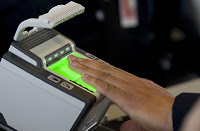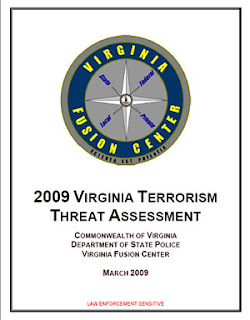eu plans biometric border checks from time
from time:
It is a very 21st century conundrum: how can modern, open democracies provide basic homeland security in a world with nearly limitless mobility? On Wednesday, the European Commission tried to answer that by unveiling a border management plan calling for fingerprinting all foreign visitors to the European Union.lockheed secures contract to expand biometric database from washington post
from washington post:
The FBI yesterday announced the award of a $1 billion, 10-year contract to Lockheed Martin to develop what is expected to be the world's largest crime-fighting computer database of biometric information, including fingerprints, palm prints, iris patterns and face images.
Under its contract to build Next Generation Identification, the Bethesda contractor will expand on the FBI's electronic database of 55 million sets of fingerprints and criminal histories used by law enforcement and other authorities. The aim is to make the query and results process quicker, more flexible and more accurate.
Lockheed built and maintains the fingerprint database.dhs eases immigrant background checks from mcclatchy
from mcclatchy:
In a major policy shift aimed at reducing a ballooning immigration backlog, the Department of Homeland Security is preparing to grant permanent residency to tens of thousands of applicants before the FBI completes a required background check... However, advocates of stricter immigration enforcement accused DHS of creating security loopholes, rather than solving the backlog problem.federal buildings become real id zones from cnet
from cnet:
Starting May 11, Americans living in states that don't comply with new federal regulations could be barred from entering Washington D.C.'s visitor center and collecting the complimentary maps and brochures-unless they happen to bring a U.S. passport or military ID with them. That not-very-welcoming rule is part of a 2005 law called the Real ID Act, which takes effect in just over three months. It says that driver's licenses from states that have not agreed to Real ID mandates from the Department of Homeland Security, or which have not requested a deadline extension, can no longer be used to access "federal facilities."
 from raw story
from raw story:
President Bush suffered a major defeat Thursday as the immigration reform bill was defeated in the Senate. Although there had been strong conservative opposition to the bill, the president had been pushing for it hard the last few weeks.
"The Senate drove a stake Thursday through President Bush's plan to legalize millions of unlawful immigrants, likely postponing major action on immigration until after the 2008 elections," the Associated Press reports...
Bush, seeking to salvage the biggest domestic initiative of his final two years in office, called senators earlier in the morning seeking help.
However, supporters needed 60 votes in the 100-member Senate to keep the bill alive. Aligned against it were conservatives who derided the legislation as a grant of amnesty for illegal behavior and some Democrats who said it would leave a new group of temporary workers vulnerable to exploitation.
Supporters pointed to the bill's tougher border security and workplace enforcement measures, along with an immediate infusion of $4.4 billion to pay for them, as reasons to keep the bill alive for a final vote Friday.
The carefully crafted compromise was left for dead after a similar vote three weeks ago but was revived by Bush and Senate Democratic Leader Harry Reid, who gave opponents more chances to change it.related: sen. sessions releases list of 20 loopholes in the senate immigration bill
 teen arrested in oregon car bomb plot led 2 lives*
teen arrested in oregon car bomb plot led 2 lives* 








